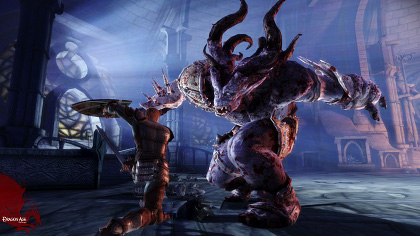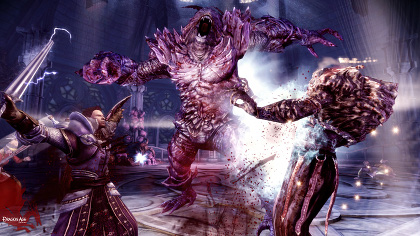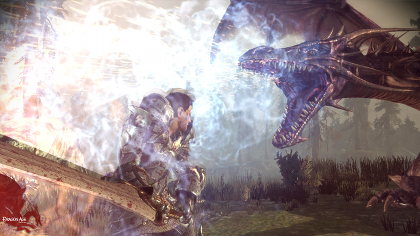Earlier this month, I had a chance to sit down with one of BioWare‘s lead writers, David Gaider, and talk to him about the story progression and interactivity of BioWare’s latest fantasy epic, Dragon Age: Origins, scheduled for release on November 3rd, 2009, for the PC, PS3, and Xbox360. David’s previous work writing for BioWare includes Neverwinter Nights, the Baldur’s Gate series, and Star Wars: Knights of the Old Republic. Dragon Age follows the player as a member of the Grey Wardens, the first and last line of defense for the races of Ferelden against the encroaching wave of the foul darkspawn, and David kindly walked me through the major narrative structure and how it will affect player characters. Come on in, and check it out!
Almost every time that I see Dragon Age: Origins being promoted, I usually read or hear the phrase “unprecedented player choice”, and I was wondering if you could explain what exactly that actually means and how that’s going to affect players of the game as they progress through the story.
DG: Okay, I think one of the main features you have to be aware of is the origins. There’s a lot of games that when you’re making your character you’re going to be selecting various options, and normally they have some gameplay mechanics, like they give you some extra points for strength. We have six origins in the game that you select either based on your class or your race and there is an entire chapter of the game that is unique to that origin. We use that to introduce the world to the player from the perspective of the character they’ve chosen. For example, if you’re a dwarf, you start off in the city of the dwarves called Orzammar, you learn what is unique about dwarves in this world, how they look on the other races, and then all the origins dovetail into the main plot but have an effect throughout the rest of the game. There are two dwarven origins, a caste-less outsider and a nobleman of the highest ranking, so your interactions will be quite different based on what kind of dwarf you are as well.
Other games that we’ve made in the past have had moral decisions as part of the game mechanic; Mass Effect had that with the Renegade and Paragon points, basically good and evil points. It set up a dichotomy, which is quite nice. However, the problem with the “moral meter” is that even though we’re offering you choices, it forces you to choose one or the other, and then you’re on a fixed path. Most games like that don’t reward a player for choosing good this time, then evil next time, because then you end up in the middle, and the benefits of the meter are always tied to being at the extreme ends. So in Dragon Age, we don’t have a good and evil meter, all the decisions in the game have solutions that are logical, where we thought, “let’s provide the player with solid reasons for doing these things,” which allows us to have a lot of room for grayness in morality.
You clearly want to give players a choice in the story that they follow, but on the other hand, you also need to control the narrative, and I’m wondering how Dragon Age is going to go about doing that.
DG: Well, it depends. Say you have a decision at some point where you’re making a choice that could affect the entire kingdom. A lot of times, it’s easier to put those kinds of decisions at the end of the game. If you can provide an emotionally satisfying decision, you don’t need to worry as much about the consequences, because they affect things beyond the scope of the actual gameplay. I love those kinds of endings, actually. You can move those decisions earlier, and we do that in a couple places in Dragon Age, where you make a huge decision, and that can be very expensive for developers to follow both the results of that decision and carry them throughout the rest of the game, but sometimes you have to decide if it’s worth it and pony up the development cost.
The other decisions you do can have local consequences instead of global. Other games have done this as well. Using Fallout 2 as an example, sometimes you go to a hub, like New Reno or various other settlements or areas, where the quests you do there have lots of ways of completing those quests or big results from those quests, but they would only affect that area.
So you can make the consequences local, and a lot of our writing is sunk into the party members. About a third of the game’s writing is in those party members. There are plots that are specific to the members you recruit, and depend on their reactions to the actions you take. They all have different moralities, different things which are important to them, so you’re going to have to carefully manage how they react to your actions. Sometimes if you’re persuasive, you can talk them into agreeing with you.
So the player’s choices are actually going to affect the party dynamic?
DG: Yes. The approval of the party members is individual; they react to things based on their own personal morals. There are cases where they will leave the party and fight you, and join the other side.

So would it be fair to say that each of the origins represents a different potential person that players can play in one much larger meta-story?
DG: Yeah, it’s a different path, it’s a different viewpoint. A player who is playing a dwarf or an elf is likely going to feel differently about it. Say they’re an elf, who is an underclass in this world, they’re a second-class citizen, they might feel very bitter towards humanity, so their introduction towards these elements is going to be very elf-centric, so they might feel differently when they go elsewhere, they’re going to be treated differently by NPCs they encounter, a lot of humans they encounter are going to be prejudiced against them, and there’s an element of racism in the game when it comes to that. Some of the party members are going to react very differently to an elf compared to a human.
One thing that I’ve always liked about a lot of the BioWare games is just how much players can get involved in the actual dialogue in between the action scenes. Have you taken another step into actually integrating the action and the dialogue?
DG: Yeah, you have to be aware of the pacing when it comes to plots. You don’t want action, action, and now the player is sitting there having a long, drawn-out conversation. At the same time, you don’t want to just have action, and then have all the interactions be superficial. There’s a little bit of give and take between those two elements. Essentially, what we have is not as cinematic as Mass Effect, but I think Mass Effect is a good cue to use. In terms of how you’re seeing the dialogue, you’re not just getting a close-up of someone’s face, you’re actually seeing animation, you’re seeing camera-work, so it becomes cinematic in that respect. The only difference being, and in this case as opposed to Mass Effect, you’re not actually hearing the player character talk. You see the lines that you’re saying and they’re silent. A lot of games do that, Fallout 3 did it recently, I think Mass Effect was one of the few that didn’t, as a matter of fact. The reason for that is to allow you more customization of your own character. In Mass Effect, you play Commander Shepard, who’s just one character. Here, you can be an elf or a dwarf or a human of various origins and social classes, so we didn’t want to put a voice in the player’s mouth.
We are going for a more cinematic experience where you are involved with the dialogue. There’s a lot of paths you can go through where dialogue with your party members will grow as the storyline goes on, as your relationship with them increases. Dragon Age has a lot of dialogue. In terms of the amount of writing in it, it’s our largest game since Baldur’s Gate II.

As gaming technology improves, and certainly the visual elements get more and more expansive, have you ever been limited in how expansive you can make a multi-branch narrative due to the lack of storage space on a game disc?
DG: It’s not so much about storage space, as it is about the costs to create content. If you think back to the Baldur’s Gate series, it had reached a point where that sort of 2D art had reached a point where we could create lots of content fairly cheaply. And then we entered the 3D era, and suddenly it was much more problematic, but now we’re slowly reaching the point where the technology exists where we can start to think about maybe making areas or cinematics more cheaply than we were, or at the very least where using them allows us to have access to more storytelling tools rather than less. You can see some of that already, in some of the open world stuff that’s out there, like Oblivion, for instance. For its time, it looked excellent, and it felt like there was this entire world. I think for the people that really loved Oblivion, that was the part that they fell in love with.
If you look at something like Mass Effect, the sheer cinematic quality alone, the fact they took that level of cinematics and incorporated it into the gameplay, and in the game the dialogues were so sharp, that’s wonderful. If we can just take that process and keep refining it, we’re going to end up with something really special down the line. In terms of being part of the overall genre, making better RPGs, making better stories, from my perspective as a writer, that’s the ultimate goal. I’m in this to tell better stories, to tell bigger stories, to tell the kinds of stories that the fans will remember 10-20 years down the line. Where I don’t want to get to is the point where they rent the game, it’s really short, and they play it and forget about it a month later. That’s not what I make RPGs to do.
We shortened the transcription for length, but if you have a little free time (like 40 min), check out the complete interview here, and listen to David’s thoughts on media tie-ins, the sanitization of fantasy, balancing art and story content, and the narrative headaches of multiplayer vs single player.










